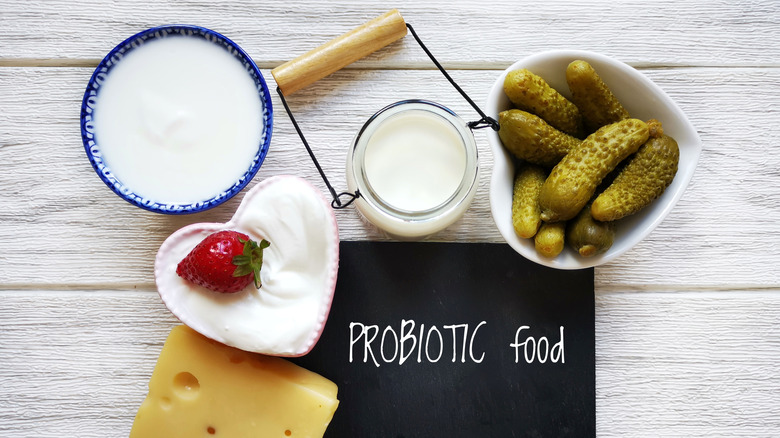This Is How Many Probiotics You Should Actually Be Taking To See Results
Probiotics are a hot topic in the field of health and wellness at the moment. Research on probiotics has exploded in recent years, including the Human Microbiome Project, which was conducted between 2007 and 2016 and supported by the National Institute of Health (NIH). The Project was undertaken to learn more about the bacteria that live in and on the human body, and their effect on various diseases (via NIH). And as science has taken a greater interest in this aspect of health, so have consumers. Probiotic use among American adults quadrupled between 2007 and 2012.
But many questions remain about which strains of bacteria are best for treating various conditions, and, especially, what the ideal dosage is.
Researchers have come up with a general guideline — a starting point — for probiotic dosage, recommending between five and 10 billion 'colony-forming units' (CFU) per day for children, and between 10 and 20 billion CFUs daily for adults (via American Family Physician). A colony-forming unit is a measure of the estimated number of live microbes found in a particular probiotic product, per Mindbodygreen. The number of CFUs in a product can generally be found on the label.
Probiotic-rich foods include yogurt
But these are just guidelines. Figuring out not only the correct dosage, but also the correct strains of bacteria to take, is a complicated undertaking that should vary according to a person's individual health condition. Particular strains of bacteria may provide very specific health benefits. Registered dietitian Keri Gans, author of The Small Change Diet, told Mindbodygreen that "[T]here is no general rule, the amount needed may vary from person to person, depending on the reason they are taking probiotics."
Probiotics are also a case where 'more' does not equal 'better.' Integrative physician Robert Rountree adds, "More doesn't necessarily equal better. They have to be targeted. Every bacterium does different things." That is why, while probiotic supplements can be a valuable tool in disease management, it's important to research the subject and consult with your doctor before beginning a probiotic regimen.
Keep in mind also that not everyone needs to take probiotic supplements, and probiotics can also be found in a variety of foods, especially fermented products like yogurt.


